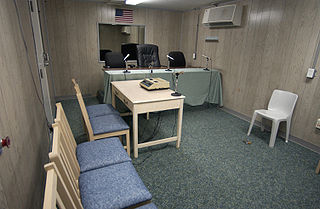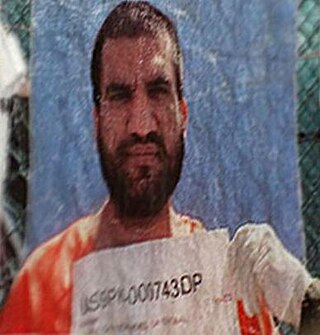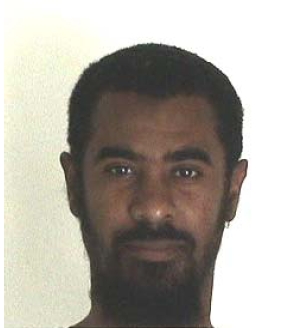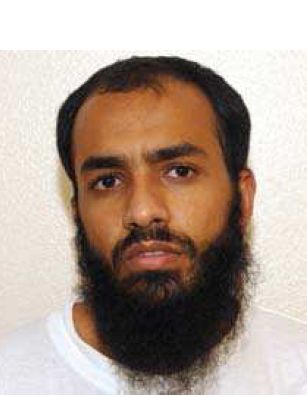
Ibrahim Ahmed Mahmoud al Qosi is a Sudanese militant and paymaster for al-Qaeda. Qosi was held since January 2002 in extrajudicial detention in the United States Guantanamo Bay detainment camps, in Cuba. His Guantanamo Internment Serial Number is 54.

The Combatant Status Review Tribunals (CSRT) were a set of tribunals for confirming whether detainees held by the United States at the Guantanamo Bay detention camp had been correctly designated as "enemy combatants". The CSRTs were established July 7, 2004 by order of U.S. Deputy Secretary of Defense Paul Wolfowitz after U.S. Supreme Court rulings in Hamdi v. Rumsfeld and Rasul v. Bush and were coordinated through the Office for the Administrative Review of the Detention of Enemy Combatants.

Yasin Qasem Muhammad Ismail is a Yemeni held in extrajudicial detention in the United States Guantanamo Bay detainment camps, in Cuba. His Guantanamo Internment Serial Number is 522. Joint Task Force Guantanamo counter-terrorism analysts estimate he was born in 1979, in Ibb, Yemen.

Muhammad Saad Iqbal is a Pakistani citizen who was held in extrajudicial detention in the United States Guantanamo Bay detention camps, in Cuba. Madni's Guantanamo Internment Serial Number was 743. The Department of Defense reports that he was born on October 17, 1977.
Hamidullah was a citizen of Afghanistan, who was held in extrajudicial detention in the United States's Guantanamo Bay detention camps, in Cuba. His Guantanamo Internee Security Number is 1119. Joint Task Force Guantanamo counter-terrorism analysts estimate he was born in 1963, in Kabul, Afghanistan.

Sulaiman Awath Sulaiman Bin Ageel Al Nahdi is a citizen of Yemen, who held in extrajudicial detention in the United States Guantanamo Bay detainment camps, in Cuba, from May 5, 2002, until November 16, 2015. Al Nahdi's Guantanamo Internment Serial Number is 511. The Department of Defense reports that al Nahdi was born on December 1, 1974, in Mukalla, Yemen.

Ghaleb Nassar al-Bihani is a citizen of Yemen formerly held in the United States Guantanamo Bay detainment camps, in Cuba. The Department of Defense estimate that he was born in 1979, in Tabuk, Saudi Arabia.
Jawad Jabber Sadkhan is a citizen of Iraq who was held in extrajudicial detention in the United States Guantanamo Bay detainment camps, in Cuba. Sadkhan's Guantanamo Internment Serial Number was 433.
Abdul Majid Muhammed is a citizen of Iran who was held in extrajudicial detention in the United States Guantanamo Bay detention camp in Cuba.

Ibrahim Othman Ibrahim Idris was a citizen of Sudan, formerly held in extrajudicial detention in the United States' Guantanamo Bay detainment camps, in Cuba. His detainee ID number was 036.

Tarek Ali Abdullah Ahmed Baada is a citizen of Yemen, who was formerly held in extrajudicial detention in the United States Guantanamo Bay detainment camps, in Cuba. His detainee ID number is 178. Joint Task Force Guantanamo counter-terrorism analysts estimate that Baada was born in 1978 in Shebwa, Yemen.
Adil Hadi al Jazairi Bin Hamlili is a citizen of Algeria who was held in extrajudicial detention in the United States Guantanamo Bay detainment camps, in Cuba. The US Department of Defense reports that Bin Hamlili was born on 26 June 1976, in Oram (Oran) [sic] Algeria. His Guantanamo Internment Serial Number was 1452.
Al Odah v. United States is a court case filed by the Center for Constitutional Rights and co-counsels challenging the legality of the continued detention as enemy combatants of Guantanamo detainees. It was consolidated with Boumediene v. Bush (2008), which is the lead name of the decision.
In United States law, habeas corpus is a recourse challenging the reasons or conditions of a person's detention under color of law. The Guantanamo Bay detention camp is a United States military prison located within Guantanamo Bay Naval Base. A persistent standard of indefinite detention without trial and incidents of torture led the operations of the Guantanamo Bay detention camp to be challenged internationally as an affront to international human rights, and challenged domestically as a violation of the Due Process Clause of the Fifth and Fourteenth amendments of the United States Constitution, including the right of petition for habeas corpus. In 19 February 2002, Guantanamo detainees petitioned in federal court for a writ of habeas corpus to review the legality of their detention.

David H. Remes is an American lawyer.
Bismullah v. Gates is a writ of habeas corpus appeal in the United States Justice System, on behalf of Bismullah —an Afghan detainee held by the United States in the Guantanamo Bay detention camps, in Cuba. It was one of over 200 habeas corpus petitions filed on behalf of detainees held in the Guantanamo Bay detention camp in Cuba.
Guantananmo detainees have been allowed to initiate appeals in Washington DC Courts since the passage of the Detainee Treatment Act of 2005 (DTA) closed off the right of Guantanamo captives to submit new petitions of habeas corpus. It substituted a right to a limited appeal to Federal Courts of appeal in Washington DC. The Act allowed detainees to challenge whether their Combatant Status Review Tribunals had correctly followed the rules laid out by the Department of Defense.

Muhammed Murdi Issa Al Zahrani is a citizen of Saudi Arabia who was held in the United States's Guantanamo Bay detention camps, in Cuba from August 5, 2002, until November 22, 2014. His Guantanamo Internment Serial Number is 713. Joint Task Force Guantanamo counter-terrorism analysts estimate he was born in 1969, in Taif, Saudi Arabia.

Al Halmandy v. Bush, No. 1:05-cv-02385, is a writ of habeas corpus filed on behalf of 63 Guantanamo detainees, on December 13, 2005. It was one of over 200 habeas corpus petitions filed on behalf of detainees held in the Guantanamo Bay detention camp in Cuba.

Muhammaed Yasir Ahmed Taher was a citizen of Yemen, who was held in extrajudicial detention in the United States's Guantanamo Bay detention camps, in Cuba. His Guantanamo Internment Serial Number was 679. American intelligence analysts estimate he was born in 1980, in Ibb, Yemen.












